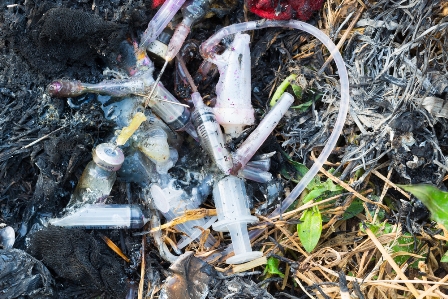Disposal of Medical Waste
The CPCB had issued “Guidelines for Handling, treatment and disposal of waste generated in Hospitals.
The Central Pollution Control Board (CPCB) compiles country-wide annual data of bio-medical waste (BMW) generation, collection and treatment based on the annual reports submitted by respective State Pollution Control Boards/ Pollution Control Committees (SPCBs/ PCCs). About 656 Tons/Day (TPD) of BMW was generated in the year 2020, out of which 590 TPD was collected and treated by the Common Bio-medical Waste Treatment facilities (CBWTFs). Further, about 84.61 TPD of incremental COVID-19 BMW was generated between May 2020 to February 2022 in the country from healthcare facilities, quarantine centres/ camps, sample collection centres, laboratories, home care/ home isolations centres engaged in treatment, diagnosis and quarantine of COVID-19 infected or suspected patients.
(BMW) generation, collection and treatment based on the annual reports submitted by respective State Pollution Control Boards/ Pollution Control Committees (SPCBs/ PCCs). About 656 Tons/Day (TPD) of BMW was generated in the year 2020, out of which 590 TPD was collected and treated by the Common Bio-medical Waste Treatment facilities (CBWTFs). Further, about 84.61 TPD of incremental COVID-19 BMW was generated between May 2020 to February 2022 in the country from healthcare facilities, quarantine centres/ camps, sample collection centres, laboratories, home care/ home isolations centres engaged in treatment, diagnosis and quarantine of COVID-19 infected or suspected patients.
The CPCB had issued “Guidelines for Handling, treatment and disposal of waste generated during treatment, diagnostics and quarantine of COVID-19 patients” in March 2020 and developed an application name, COVID19BWM to track the generation and treatment of COVID-19 BMW at CBWTFs. There are no reported cases of violation of Guidelines; however, the CPCB has issued notices to 33 nos. of CBWTFs across the country for not reporting data on COVID19BWM, as mentioned below:
- Fifteen (15) in Karnataka
- Five (5) in Maharashtra
- Two (2) CBWTFs each in Bihar, Gujarat, Jharkhand, Madhya Pradesh and Telangana
- One (1) each in Odisha, Rajasthan and Uttar Pradesh
There are 208 Common Bio-medical Waste Treatment Facilities (CBWTFs) operational in the country for treatment and disposal of Bio-medical Waste (BMW) as per the information furnished by SPCBs/ PCCs for the year 2020. The State/ UT-wise details are Annexed.
There are no operational CBWTFs in nine (9) States/ Union Territories. The BMW treatment and disposal in these areas is done through captive treatment facilities operated by healthcare facilities themselves.
To ensure the safety of workers engaged in BMW handling and collection, the CPCB guidelines on “Handling, treatment and disposal of waste generated during treatment, diagnostics and quarantine of COVID-19 patients” prescribe for regular sanitization and provision of adequate personal protective equipment like three-layer masks, splash-proof aprons/gowns, nitrile gloves, gumboots and safety goggles.
The Biomedical Waste Management Rules, 2016 (BMWM Rules, 2016) notified by the Ministry of Environment, Forest and Climate Change, (MoEFCC) stipulates source segregation of BMW into four categories and prescribe category-specific effective technological options like incineration, autoclaving, microwaving hydroclaving and chemical disinfection. The BMWM Rules, 2016 also include provisions to adopt new technologies for BMW treatment, after validation. Further, the MoEFCC is also implementing a central sector scheme to provide financial support to innovative research projects aimed at environmentally sound management of waste, including BMW.
Annexure: State-wise details of Operational CBWTFs in India
| Name of the State/Union Territory | Operational CBWTFs |
| Andaman Nicobar | Nil |
| Andhra Pradesh | 12 |
| Arunachal Pradesh | Nil |
| Assam | 1 |
| Bihar | 4 |
| Chandigarh | 1 |
| Chhattisgarh | 4 |
| Daman & Diu and Dadra & Nagar Haveli | Nil |
| Delhi | 2 |
| Goa | Nil |
| Gujarat | 20 |
| Haryana | 11 |
| Himachal Pradesh | 3 |
| Jharkhand | 4 |
| Jammu & Kashmir | 3 |
| Karnataka | 25 |
| Kerala | 1 |
| Ladakh | Nil |
| Lakshadweep | Nil |
| Madhya Pradesh | 12 |
| Maharashtra | 30 |
| Manipur | 1 |
| Meghalaya | 1 |
| Mizoram | Nil |
| Nagaland | Nil |
| Odisha | 6 |
| Puducherry | 1 |
| Punjab | 5 |
| Rajasthan | 11 |
| Sikkim | Nil |
| Tamil Nadu | 10 |
| Telangana | 11 |
| Tripura | Nil |
| Uttarakhand | 2 |
| Uttar Pradesh | 21 |
| West Bengal | 6 |
| Director General Armed Forces Medical Services (DGAFMS) | Nil |
| Total | 208 |
(Source: CPCB)
This information was given by Shri Ashwini Kumar Choubey, Minister of State, Ministry of Environment, Forest & Climate Change in Lok Sabha.
